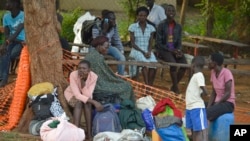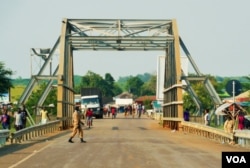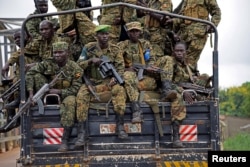The United Nations Office of the High Commissioner for Human Rights is calling on the Security Council to take tougher action after finding that South Sudan security forces killed civilians, raped women and girls, and looted and destroyed property with near total impunity.
U.N. High Commissioner Zeid Ra'ad Al Hussein said "tensions remain very high, and violations continued to take place in the capital, Juba, and other parts of the country," after investigating five days of fighting that started July 7.
In a report released this week, the OHCHR said it documented at least 217 cases of sexual violence in Juba between July 8 and July 25. Women from various ethnic groups were targeted and raped by some armed youths believed to be affiliated with the SPLA in opposition, but for the most part, the report said, the perpetrators were government soldiers. The report, which was delivered to the U.N. Security Council, said many victims were minors.
More than 100 women and girls reported being raped or gang-raped on the road leading out of Juba to Yei, after the initial fighting had subsided.
Witnesses and victims told human rights workers that women and children also were robbed of their belongings and beaten up by SPLA soldiers and other security officers at various checkpoints.
Rupert Colville, a Geneva-based spokesperson for OHCHR, said U.N. investigators documented at least 73 civilian deaths, but believe a more accurate count will be in the hundreds. Colville said investigators also expect the number of rape cases to rise.
"Often women who have been through this kind of experience don't report it,” he said. “So, the fact that we have already documented at least 217 cases gives you an idea of the scale of what was going on."
Issues reported since 2013
The international human rights community, including Amnesty International and Human Rights Watch, has documented widespread violence committed by government soldiers against civilians since the conflict erupted in late 2013. A report released in March by the U.N. Human Rights Office said both government and opposition forces carried out thousands of brutal rapes and gang rapes since 2013 as a weapon of war.
Colville said killings, rapes and other crimes continue in South Sudan largely because of widespread impunity. He said victims told the U.N. that government soldiers would take groups of women at a time, hold them against their will, and rape them.
"A lot of checkpoints were set up around the city while the fighting was going on or after it broke out on the 7th of July, and these seemed to be the places where women, in particular, were seemed to be held and then raped," he said.
U.N., government action urged
Colville said the government is primarily responsible for arresting soldiers who commit crimes, but the U.N. needs to step up and hold government leaders accountable.
"And I think one call that we are making today is to the Security Council to put pressure on the government, in particular, to start changing this cycle,” he said. “Also the African Union, I mean, there has been a decision to set up a hybrid court … that has been very slow to get off the ground, but that could help. It's a model that has helped in other countries where the local system is too weak to cope with the crimes that have been committed."
Last week, military spokesman Lul Ruadi Koang said the army detained 14 SPLA soldiers accused of killing civilians and looting property. The SPLA has set up a court martial, though soldiers have yet to be tried.
Colville said far more must be done to ensure that the culture of violence ends in South Sudan.
The Transitional Government of National Unity, which was established in late April, was supposed to pave the way for the creation of a hybrid court designed to deliver justice to victims of South Sudan's 32-month conflict. The hybrid court has never been set up.








